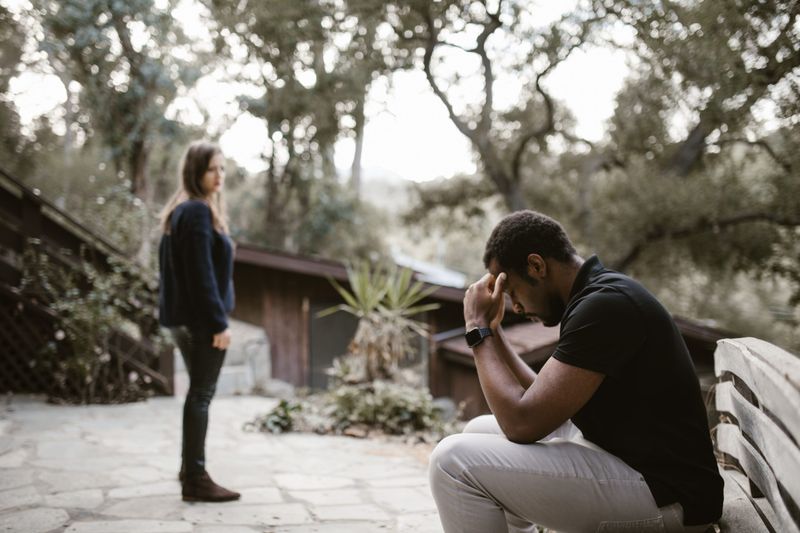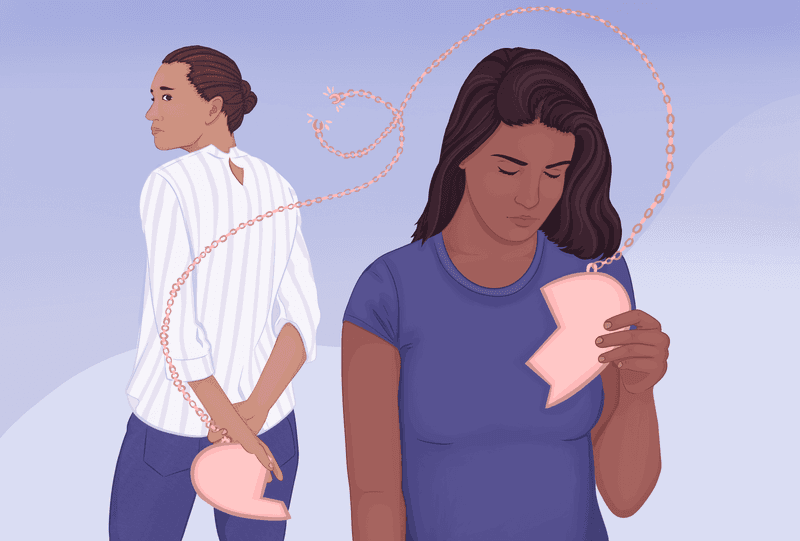Ending a relationship is never easy, but sometimes it’s the healthiest choice. Recognizing the signs that it’s time to move on can provide clarity and peace of mind.
1. You Feel Lonelier With Them Than Without Them
Feeling lonely in a relationship is like being in a room full of people but still feeling invisible. The connection that once brought warmth now feels hollow. You may share a space, but emotionally, you’re miles apart, and the silence between you grows louder.
Embracing solitude becomes a comforting alternative to the isolation felt when together. It’s not about the absence of love but the absence of connection. The realization that you’re happier alone signifies the end of the shared journey.
Choosing to part ways opens the door to finding a real, fulfilling bond elsewhere. Don’t let fear of loneliness keep you in a loveless partnership.
2. Every Conversation Ends in Defensiveness
When every conversation turns into a battlefield, it’s clear something’s amiss. Defensiveness replaces understanding, creating a cycle of blame and hurt. What began as a simple discussion spirals into conflict, leaving both parties exhausted.
The inability to communicate without raising shields indicates deeper issues that words alone can’t mend. It’s a sign that the relationship has reached an impasse, where listening and empathy have been replaced by defensiveness.
In such an environment, growth stagnates. It’s time to recognize that constant battles aren’t worth the strain on your heart. Peace comes from stepping away from the warzone and towards a more harmonious existence.
3. You’re Scared to Bring Up How You Really Feel
Fear of speaking up signals a relationship governed by unease rather than openness. When expressing genuine feelings becomes a source of anxiety, it’s a red flag that safety and trust have eroded. Communication should feel liberating, not terrifying.
The fear of repercussions, whether it’s anger or dismissal, stifles your voice. A relationship that silences you isn’t nurturing; it’s suffocating. Your feelings are valid and deserve to be heard without fear.
Overcoming this fear often means moving on to a space where your voice matters. It’s crucial to value your emotional safety over a precarious bond, paving the way for healthier connections.
4. You Daydream More About Freedom Than Connection
When your thoughts drift more towards freedom than companionship, it signals a desire to escape. Daydreaming about a life without constraints indicates that the relationship feels more like a cage than a comfort.
These daydreams aren’t mere fantasies; they’re glimpses of a yearning for liberation. It’s about seeking a life where your spirit can soar without the weight of unfulfilled expectations.
Acknowledging this longing can be the catalyst for change, encouraging you to pursue a life that aligns with your dreams. Embracing freedom means giving yourself permission to walk away in search of genuine fulfillment.
5. Apologies Come with Blame, Not Change
Apologies that deflect blame rather than embrace change ring hollow. When apologies become a tool to shift responsibility rather than mend wounds, the sincerity is lost. A genuine apology should lead to growth and understanding, not lingering resentment.
In a healthy relationship, apologies pave the way for change and healing. When they come with strings attached, it shows a reluctance to truly evolve.
If the cycle of blame continues without real transformation, it’s a sign that moving on is necessary. Seek relationships where accountability is valued, and growth is mutual, not one-sided.
6. They Treat Your Needs Like Interruptions
Being treated as an interruption rather than a priority erodes your self-worth. When your needs are consistently dismissed or minimized, it shows a lack of respect and consideration. Your voice should matter and be valued, not brushed aside.
In relationships, everyone deserves to feel heard and understood. When your needs are seen as disruptions, it’s a sign that the partnership is unbalanced.
Choosing to walk away from such dynamics is an act of self-respect. Seek relationships where your presence is cherished, and your needs are met with empathy and care. You deserve more than being an afterthought.
7. You Feel Relief When They’re Away
Feeling relief in their absence speaks volumes about the relationship’s state. When solitude brings more peace than their presence, it’s a clear indicator that the relationship has run its course.
While missing someone is natural, feeling liberated when they’re gone highlights an emotional disconnection. It suggests that the partnership has become a source of stress rather than solace.
Walking away allows you to cultivate a life filled with joy and comfort, with or without a partner. Embrace the freedom to rediscover yourself and create a space where genuine happiness thrives.
8. Trust is Gone, and You’re Pretending It’s Not
Trust is the foundation of any meaningful relationship. When it erodes, pretending it’s intact becomes a façade that’s hard to maintain. The constant act of ignoring the obvious cracks exhausts both heart and soul.
Without trust, doubt and suspicion fill the gaps, leading to a cycle of secretive behavior and emotional distance. This pretense only delays the inevitable and deepens the wound.
Acknowledging the absence of trust is the first step to healing. Letting go allows you to rebuild trust within yourself and opens the door to future relationships grounded in sincerity and openness.
9. You’ve Stopped Making Future Plans Together
When planning a future together ceases, it’s a strong sign the relationship is stagnating. Future plans are the threads that weave shared dreams and aspirations. Without them, the relationship feels untethered and uncertain.
This lack of future vision indicates a disconnect in goals and values. It reflects a reluctance to invest in a shared journey, highlighting the distance that has grown between you.
Recognizing this absence of direction emphasizes the need to reassess the relationship’s viability. Moving on can provide the clarity needed to pursue fulfilling paths, both individually and with future partners who share your dreams.
10. You Shrink Yourself to Avoid Arguments
When you begin to shrink yourself, avoiding conflict becomes a survival strategy. This shrinking act, aimed at keeping the peace, chips away at your identity and self-worth. Your essence deserves space to thrive, not to be stifled.
Constantly walking on eggshells isn’t sustainable. It’s a sign that the relationship demands more than you should have to give, diminishing your true self in the process.
Choosing to leave is choosing to reclaim your full self, free from the constraints of fear and compromise. Embrace relationships where you’re celebrated, not silenced.
11. Their Wins Don’t Feel Like Yours Anymore
When their victories no longer inspire joy, it’s a sign the emotional connection has waned. Sharing in each other’s successes is a cornerstone of a healthy relationship. Indifference signifies a growing divide that’s hard to ignore.
This detachment suggests that the partnership lacks the mutual support and enthusiasm that once existed. It’s a cue to reassess whether the relationship still serves both individuals.
Letting go can be a pathway to rediscovering shared joy and support in new connections. Celebrate relationships where mutual encouragement and happiness are abundant.
12. You Dread the End of the Day Instead of Looking Forward to It
Dreading the end of the day reveals a significant emotional burden. Instead of anticipating comfort and connection, you’re met with apprehension. This pattern indicates that home has become a place of stress rather than solace.
The thought of returning to an environment that doesn’t feel safe or welcoming drains your spirit. It’s a clear indication that something vital is missing.
Choosing to change your circumstances opens the door to evenings filled with peace and warmth. Seek spaces that uplift rather than suffocate, where the end of the day becomes something to cherish.
13. You Question Your Own Worth More Often
Feeling inadequate within a relationship signals deep-seated issues that need addressing. When interactions lead you to question your worth, it’s a sign that the partnership is damaging rather than nurturing.
Your self-esteem should be bolstered by love, not diminished. Constantly doubting your value indicates that the relationship isn’t affirming your significance.
Leaving allows you to rebuild confidence and find connections that celebrate your worth. Embrace environments where you’re valued and appreciated for who you truly are.
14. You Keep Hoping They’ll “Get It” Someday
Holding on to hope that they’ll understand someday can be exhausting. This waiting game often leads to disappointment when expectations aren’t met. It’s a sign that you’re investing in potential rather than reality.
When change feels elusive, it’s time to question what you’re holding onto. Genuine growth and understanding should be present, not just anticipated.
Walking away opens the possibility for relationships where mutual understanding is a given, not a hope. Seek connections where your needs are already acknowledged and valued.
15. Nothing Feels Mutual Anymore—Not Effort, Care, or Time
When mutuality disappears, the imbalance becomes unsustainable. Relationships thrive on shared effort, care, and time. When these elements fade, it’s a sign that the partnership is no longer reciprocal.
Feeling like you’re giving more than you receive leads to resentment and fatigue. This lack of balance indicates that the relationship’s foundation has eroded.
Moving on allows for the possibility of rebuilding connections where mutuality is restored. Seek out partnerships where effort and care are equally matched, nurturing a harmonious relationship.
16. You Feel Emotionally Numb Around Them
Emotional numbness around someone highlights a significant disconnect. When interactions fail to evoke any feeling, it’s a sign that the relationship has lost its essence. This numbness is a defense mechanism, a way to cope with ongoing emotional strain.
The absence of emotion suggests that something vital is missing, leaving you in a state of detachment. It’s a clear indication that the relationship doesn’t fulfill your emotional needs.
Choosing to leave allows you to seek connections that revive your emotional vitality. Surround yourself with people and environments that inspire and uplift your spirit.
17. You’ve Already Emotionally Checked Out
Being physically present but emotionally absent is a strong indicator that the relationship has ended in spirit, if not in form. When your heart and mind have drifted away, it’s time to acknowledge that the bond is broken.
Emotional detachment develops over time, often unnoticed until it’s too late. It’s a self-preservation tactic when the relationship no longer serves you.
Accepting this reality allows you to move forward with honesty and integrity. Seek out connections where your presence is fully engaged and valued, and where your emotional needs are met.
18. You Know You’d Tell a Friend to Leave If They Were in Your Shoes
Considering what advice you’d give a friend often brings clarity. If you’d urge a friend to leave a similar situation, it’s a strong indication that you should heed your own counsel.
Recognizing the disparity between what you’re experiencing and what you’d advise illuminates your true feelings. This perspective shift highlights the need for change.
Listening to your instincts allows you to act in your best interests. Walk away knowing you’re making a choice you’d advocate for someone you care about. Prioritize your well-being as you would for a cherished friend.



















